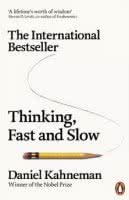Finishing this book took me some time, because I've heard it in audio-book format and commuting to my previous job was noisy and distracting to focus on hearing, but with my recent change I now can perfectly listen to voice audios.
Review

Title: Thinking Fast and Slow
Author: Daniel Kahneman
How we think is managed by two systems/fragments/"selfs" of the brain: One is impulsive and quick-thinking but prone to biases and errors in judgement, the other is slower, recalls memories and experience, but is "lazy" and tends to delegate to the "System one". Along this book we're taught how we commit lots of mistakes, misjudgements, wrong decisions, and in general kind of get tricked by ourselves. But also, we learn valuable leasons to become better at handling this situations (spoiler: take your time and think).
There are many chapters, focusing on different aspects, fears, biases, mistakes, choice-making... Full of examples, studies and tips to learn to avoid them. They are useful in most areas, from personal life, well-being and relations to business-related decisions.
To mention something not great, there are quite a few military-related remarks, for example examples of loss adversion with "selling missiles", when there are infinite less belicist examples. I understand that for the author (Hebrew and with a military past) it might be normal, but for me it strikes as a sad way of exemplification. Also, some chapters are a bit of an artificial separation. For example, gambling-related topics take multiple chapters.
Despite my small critics, this book is a must read. The best way to combat biases is to know them, and with so many examples becomes clear we're a bit flawed and should not rush on our decision taking actions.
Notes
Sadly I didn't noted everything as sometimes is hard to take notes and I cannot highlight as with Kindle books, but I think I wrote most of the important topics (for me at least).
- Two systems that drive the way we think. System 1 is fast, intuitive, and emotional; System 2 is slower, deliberative, logical
- Most important mistake our brain takes as the common truth: what you see is all there is
- Law of small numbers
- Law of averages: belief that the statistical distribution of outcomes among members of a small sample must reflect the distribution of outcomes across the population as a whole
- Most of what happens in life is random (most facts in the world are random). causal explanations are dangerous and many times wrong
- Anchoring effect
- Availability heuristic
- Statistics' [base rate])https://en.wikipedia.org/wiki/Base_rate_
- Conjunction fallacy: The probability that two events will both occur can never be greater than the probability that each will occur individually
success = skill + luck.greater sucess = more skill + lot more luck- Regression to the mean
- Intensity matching
- When we change our view of the world, we lose or weaken our hability to recall the old view. it is a weakness of our mind
- Hindsight bias
- Errors of prediction are inevitable because the world is umpredictable
- Subjective confidence shouldn't be treated as competence. low confidence can be more confident
- Intuition adds but after disciplined objective recollection
- Outcomes are gains and loses (utility of wealth): changes of wealth instead of states of wealth
- Theory-induced blindness
- Human brain gives priority to bad news
- Good relations involve more avoiding bad moments than having good moments
- Cuantification is much more powerful than mere numbers or percentages. eg.
4 out of 101 ...vs40% ... - Narrow framing vs broad framing
- Sunk cost fallacy
- Losses evoke stronger feelings than costs
Tags: Books Productivity Reviews Soft Skills